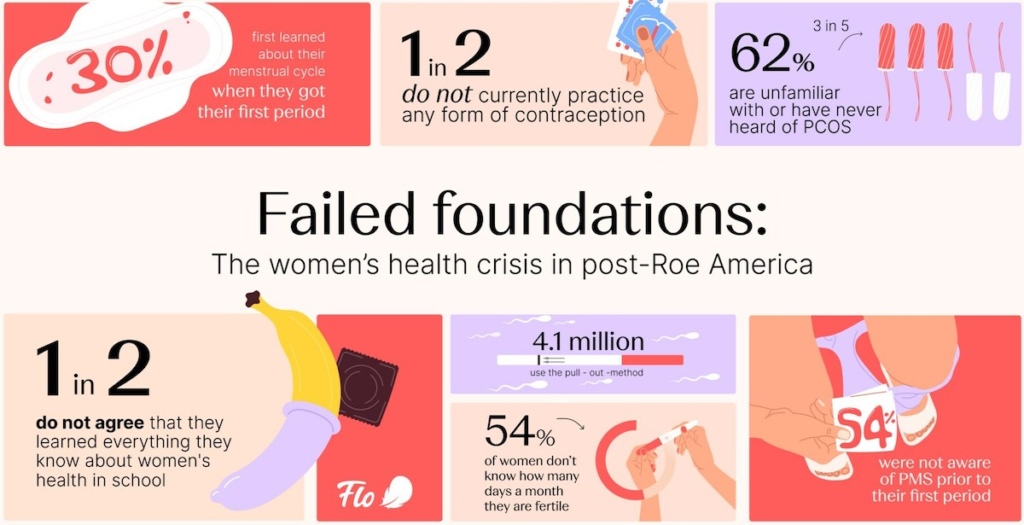
In the aftermath of the landmark overturning of Roe v. Wade, American women find themselves navigating a complex landscape, where access to credible women’s health information has become increasingly scarce. Assessing this troubling scenario, Flo Health has released a new report titled “Failed foundations: The women’s health crisis in post-Roe America.”
The report exposes glaring knowledge gaps across sexual and menstrual health, leaving millions of women ill-equipped to make informed decisions about their own bodies. To compile the report, Flo Health conducted a nationwide survey of American women between the ages of 18 and 55.
Worrying Knowledge Gaps
The results unveiled worrying statistics, painting a stark picture of the prevailing lack of knowledge.
1. Menstruation Education Starts with Period Onset
Startlingly, 30% of women disclosed that they first learned about menstruation when their period began. This revelation points to a woeful absence of comprehensive menstrual health education within schools and at home. Such ignorance may lead to a host of unintended consequences, leaving young women unprepared to handle menstruation’s challenges.
2. Social Media Trumps School in Health Education
In an age dominated by social media, 63% of women aged 18 to 24 stated they learned more about women’s health from platforms like Facebook, Instagram, and TikTok than they did in school. This concerning trend raises red flags, as the rise of misinformation and disinformation on these digital channels jeopardizes women’s health decisions.
3. Ignorance Surrounding Premenstrual Syndrome
More than half (54%) of women were unaware of premenstrual syndrome (PMS) until they experienced their first period. PMS affects millions of women worldwide and can significantly impact their emotional and physical well-being. The absence of early education on this topic may exacerbate women’s challenges during their menstrual cycles.
4. Contraception Conundrum
Astonishingly, 56% of women admitted to not using any form of contraception. This revelation raises concerns about the lack of knowledge surrounding contraceptive options and family planning methods, which could lead to unintended pregnancies and reproductive health issues.
5. Fertility Awareness Gap
More than half (54%) of women surveyed were unaware of their fertile days each month. This lack of fertility awareness may hinder family planning efforts and lead to unintended pregnancies or fertility-related anxieties.
Closing the Gap: A Collective Effort
As the post-Roe America grapples with a complex women’s health crisis, the need for improved access to medically credible information is undeniable. “Technology like social media, search engines, and artificial intelligence further complicate the process for women to find accurate information, which is buried among a sea of generalized health advice, misinformation, and deliberate disinformation,” said Dr. Claudia Pastides, director of medical accuracy at Flo Health. “Through the findings of this report and listening to our American users, we realized the US landscape is particularly challenging due to the rippling effects of the overturn of Roe v. Wade. Flo Health wants to empower women to better understand their bodies so they can make the most informed decisions for their health.”
The revelations from Flo Health’s report serve as a call to action for policymakers, educators, and healthcare providers to prioritize comprehensive health education. Closing the knowledge gap is mission-critical in empowering women to make informed decisions about their bodies and take control of their reproductive health.



